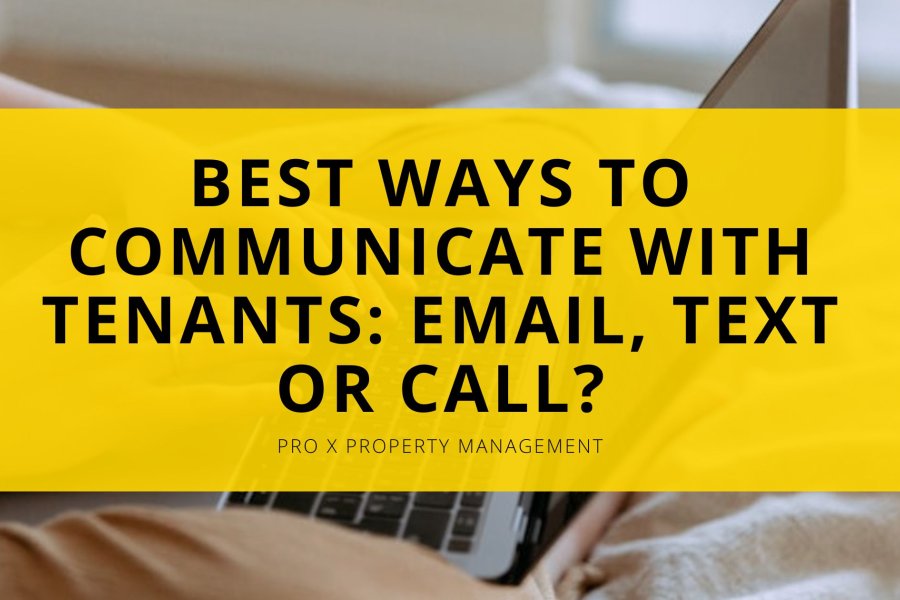
Ever wondered what's the secret to seamless landlord-tenant communication? Well, we've got the answers! As landlords, connecting with tenants is key, but the age-old question remains: Email, Text, or Call?
In this guide, we unravel the best ways to bridge the communication gap effectively. Keep reading to learn about the pros and cons of each medium, and discover the perfect recipe for tenant satisfaction.
From quick text updates to the formality of emails and the personal touch of a call, we explore the nuances that make your connection with tenants not just effective, but exceptional. Let's transform your landlord-tenant communication approach!
When to Call Your Tenants
In a world increasingly dominated by digital interactions, picking up the phone to call your tenants can be a powerful way to add a personal touch. It signifies that the matter at hand holds significance. Here are situations where opting for a phone call may be the most effective:
-
Emergencies: In urgent situations that require immediate action, a phone call cuts through the noise, conveying the critical nature of the issue and ensuring a swift response.
-
Building Rapport: A friendly check-in via a phone call can strengthen your relationship with tenants, going beyond written words and fostering goodwill and trust.
-
Clarifying Complex Issues: When written communication leads to confusion, a call can bring clarity. Real-time questions and answers help reduce misunderstandings and provide instant resolutions.

- Important Announcements: For significant updates affecting living conditions, such as major property renovations, a phone call demonstrates consideration for the tenant's experience and allows for immediate feedback.
How to Make Effective Phone Calls
-
Be Concise and Prepared: Respect your tenant's time by being clear about the purpose of the call and staying on topic.
-
Document the Call: Send a brief summary via email or text after the conversation to provide a paper trail and reinforce discussion points.
-
Respect Privacy: Unless it’s an emergency, call during reasonable hours and maintain a professional tone, respecting the tenant's privacy.
Note: A phone call’s legal standing may vary. Always follow up verbal agreements with written confirmation to ensure clarity for both parties.
When to Email Your Tenants
When it comes to email communication with your tenants, the key lies in balancing the need for detailed documentation with the convenience of digital correspondence. Email is the ideal choice for non-urgent, formal communications where clarity and records are paramount. Use email to:
-
Convey Detailed Information: Share lease agreements, policy changes, or detailed instructions.
-
Document Interactions: Maintain a record of all interactions for a timestamped audit trail.
-
Send Scheduled Notices: Automate reminders, rent notices, and routine inspection dates for timely communication.
-
Attach Necessary Documents: Use email to send photos, PDFs, and other documents for comprehensive communication.
How to Write Professional Emails

-
Be Clear and Concise: Ensure every email has a purpose and is easily understood.
-
Avoid Spam: Send only necessary and relevant emails.
-
Include Contact Information: Make it easy for tenants to reach you with any questions.
Note: Emails generally serve as legal documentation, but certain legal notices may require more formal delivery methods. Always verify with local laws and regulations.
When to Text Your Tenants
Text messaging can be an efficient and widely read communication method, ideal for various situations:
-
Instantaneous Reach: Use texts to send reminders about rent due dates or upcoming maintenance, as they are almost instantly seen and acknowledged by tenants.
-
Accessibility for All: Unlike emails or phone calls, texts are less dependent on technology and can be received on basic mobile phones.
-
Engagement and Response: Texting invites quicker responses than emails and is less demanding than phone calls, facilitating swift tenant action.
-
Convenience and Preference: Many tenants prefer texting due to its convenience and non-intrusive nature.
How to Text Responsibly and Effectively
-
Obtain Permission: Ensure tenants have agreed to receive text messages.
-
Be Purposeful: Clearly communicate the types of messages tenants can expect via text.
-
Set Boundaries: Define appropriate topics for texting and direct tenants to proper channels for official matters.
Note: Legally, while text messages can be recognized as electronic communication, essential notices often require a hard copy for legal protection. Reserve texts for reminders, follow-ups, or more casual communication.
Additional Things to Keep In Mind

Contacting tenants is a crucial aspect of landlord responsibilities, and ensuring effective communication is essential for a positive landlord-tenant relationship.
Here are some key considerations for landlords communicating with their tenants:
- Always have a clear reason for reaching out.
- Avoid contacting during odd hours; respect their space and privacy.
- Maintain a professional tone in all communications.
- Clearly communicate information to avoid confusion.
- Keep a record of documents, emails, texts, and phone calls.
- Respond promptly to tenant inquiries.
- Understand local laws for communication compliance.
- Respect the tenant's preferred communication method.
- Outline emergency contact procedures.
- Summarise key points in writing for clarity.
Final Thoughts
Each communication method has its merits, which align with different needs and scenarios. Whether you're fostering rapport, clarifying complexities, or sharing crucial updates, choosing the right communication tool is key.
Remember, amidst these choices, the expertise of a property management company like Pro X Property Management can be your guiding thread.
Our seasoned professionals ensure seamless interactions, leaving you with peace of mind and time to focus on what matters most. Elevate your landlord experience with Pro X Property Management!
